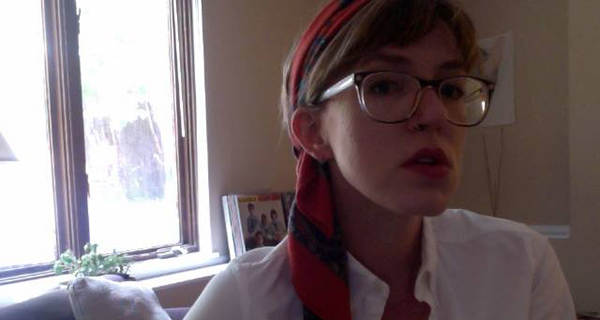
We're thrilled to welcome Ella Longpre to the Lighthouse Faculty, where she'll be teaching hybrid, poetry, and nonfiction. In advance of her first class, a Daytime All-Levels Poetry Workshop, we asked her a few questions about writing rules, terrible movies, and the importance of listening as a teacher.
On Twitter, you retweeted the Mary Oliver quote, “I don’t want to end up simply having visited this world.” If you could only choose one of your writing related endeavors to date, which would you want to be remembered for?
One of my first non-music performances: I read a difficult piece on domestic violence and ripped fabric with my teeth. Something about the non-textual presence of the performance, and the number of people affected or moved by the piece; it was one of the few times that my very private, interior self was so public. I would want to be remembered that way. But I think embracing that you won't be remembered, as an artist, really takes some of the pressure off.
You're in a band called Giselle and the Willys, how similar is your approach to writing music compared to how you approach other writing projects?
My approach to music is a model for me, right now, of what I would like to incorporate into my writing practice. When you practice an art professionally or even semi-professionally, then functionality, use, productivity can trump pleasure. I would like to bring more pleasure, and more trust of my own improvisation, back into my writing.
“Rules” of writing are known to be flexible, are there any that you believe should be adhered to?
Like a lot of hybrid writers, I think of the rules of writing more like tools instead of laws. Laws define and classify, even validate or invalidate something we've made; tools inform and shape how we make it. Some projects require an array of tools, are very refined, specialized; some require a wrecking ball; and some require using a non-tool as a tool. (This metaphor is getting pretty elaborate.) For every writerly "thou shalt not" I can think of, I can think of someone who broke that rule, and made that deviance into an entire aesthetic.
What would your perfect writing space look like? (It does not have to be realistic.)
One side of my heart really wants to believe that the Oracle at Delphi would be the ideal writing space, but the more accurate part of me says one of those little carrels in the library. Or a hotel.
What book, movie, or TV series have you disliked so much, that you still get mad thinking about it?
Requiem for a Dream.
What is a question that you have never been asked, but you’ve always had an answer prepared for? Please answer it for us.
"Would you like to live on this amazing farm in Spain where you write all day, and also cook and help take care of the goats?"
Yes, I would!
Was there a teacher you had that you really loved or hated that influenced the way you teach? What do you do as a result of having had them?
Reed Bye, one of my professors in graduate school, taught contemplative poetics. He is mindfulness embodied. When a student asked him a question about a poem, he would pause for a very, very long, quiet time. People would shift in their seats. Before he answered. Watching him I realized that part of teaching is active listening.
Ella Longpre is the author of How to Keep You Alive (Civil Coping Mechanisms 2017), as well as three chapbooks of poetry, image, and prose. She has worked at The Fanzine, Bombay Gin, and The Massachusetts Review; her work has appeared in the Volta and the Denver Quarterly, as well as other journals and anthologies, and was recently translated into French. Ella lives and writes in Colorado, where she is earning her PhD at the University of Denver. She received her MFA from the Jack Kerouac School in Boulder, where she was awarded an Anne Waldman Fellowship and received a grant from the City of Boulder Arts Council. She's taught creative writing workshops at Naropa and the Putney Summer Arts Program in Vermont. Ella is nothing without her chosen family and can be found in the woods.

